Forty Years of Wholesale Value
October 13, 2025 | 15 min to read
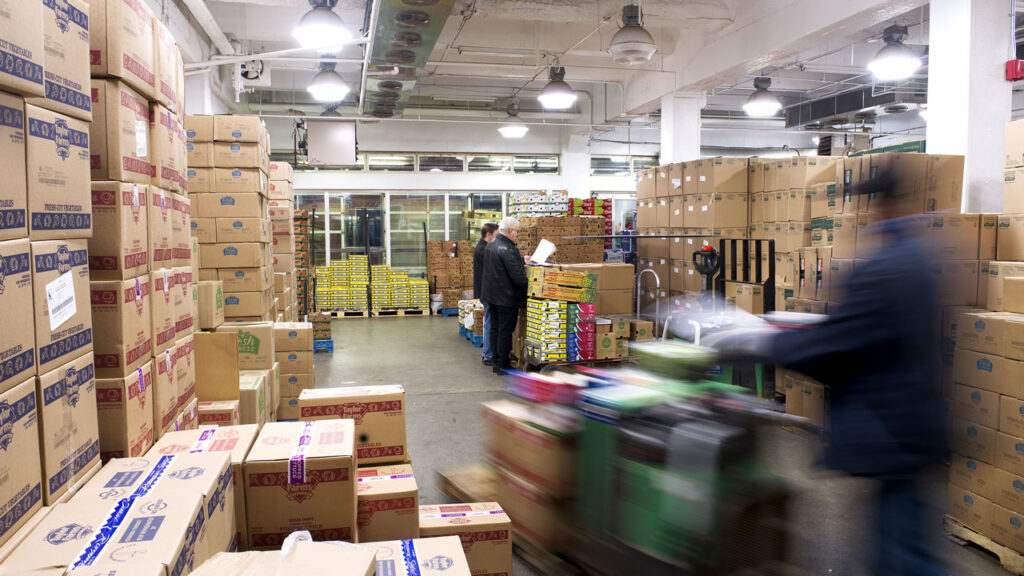
As Produce Business celebrates 40 years, wholesalers around the country share their side of the business.
During the lifespan of Produce Business, the wholesale job has evolved significantly.
“The wholesaler role has shifted tremendously,” says Gabriela D’Arrigo, vice president of marketing and communications at D’Arrigo New York, Bronx, NY. “We’ve been working with Produce Business since its inception, and the way the industry has changed has been amazing. It’s gone from handwritten communications to call cards, faxes and white boards, to now electronic.”
As the industry evolves, Katzman Produce, Bronx, NY, also evolves to customer needs, says Mario Andreani, chief operating officer. “We started off with just seven items. We’ve now expanded our offerings to over 2,500. We’ve also increased our services and diversified our business, launching into areas including merchandising, foodservice and distribution.”
Over time, wholesalers emerged as a crucial supply chain link. “We offer important value-added services, such as repacking, bagging, pre-cutting and private labeling, in addition to assuring the highest quality product,” says Jordan Grainger, vice president of sales and business development, Ben B. Schwartz & Sons, Detroit, MI. “For growers and farmers, we make their product available to a vast network of buyers they may never be able to access on their own.”
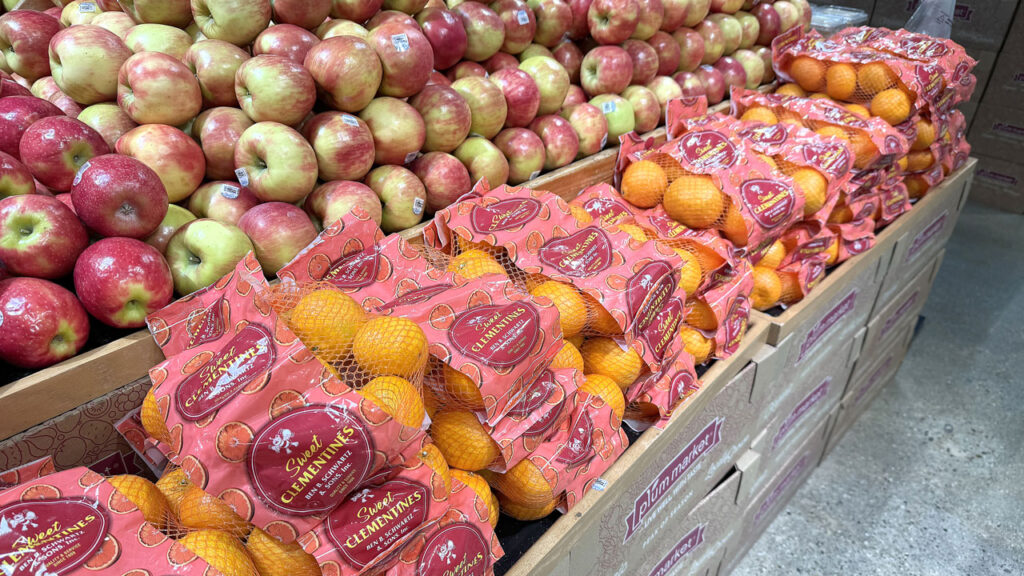
Wholesalers show value to customers in more non-traditional areas, too, explains Ryan Dietz, president of Heartland Produce Co. in Kenosha, WI. “Being seen as a service provider, as opposed to just a wholesaler, is key to staying relevant in a changing retail landscape.”
Just surviving as a produce wholesaler means your role is evolving, notes John Vena, president of John Vena Inc. (JVI) in Philadelphia, PA. “It may be the slow and steady addition of new services, or an unanticipated product request from a potential customer resulting in product lines you never imagined you could manage successfully,” he says.
BECOMING A VALUABLE PARTNER
When Willie and Lynn Itule launched Willie Itule Produce in Phoenix, AZ, in 1979, they built relationships through top-quality products and outstanding service. “Fundamentally, that hasn’t changed over the past 40 years,” says Billy Itule, chief executive. “What has changed are the ways wholesale produce distribution companies build and maintain relationships and deliver product and service.”
Wholesalers are now true partners, says Kristina Garris, executive director of fresh for Bashas’ and Food City, a division of Raley’s Companies, in Chandler, AZ, with 113 stores. “More than product is expected. They give retailers additional flexibility and efficiency by providing market insights, quality assurance, assistance with food safety, and in many cases, logistics knowledge. The partnership is now more cooperative and less transactional.”
Customers in every sector expect wider variety, which has influenced how Pacific Coast Fresh Company in Portland, OR, operates. “This shift has made us not just a supplier, but also a connector, helping customers access both the familiar and the unique,” says Tom Brugato, president.
“In foodservice, we’ve had to adapt quickly to keep up with evolving dining habits. For retail, we provide retail merchandising support, product and promotional information, sourcing updates, weather reports, pricing analysis, and a host of other services.”
Over the past 40 years, wholesalers have shifted to become strategic partners, agrees Mark Cotê, produce merchandiser at Redner’s Fresh Markets in Reading, PA, with 44 stores.
“They now provide value-added services, such as category management, logistics support, data-driven insights, and quality assurance,” he says. “Wholesalers increasingly help retailers streamline supply chains, reduce shrink, and meet evolving consumer demand for freshness and convenience.”
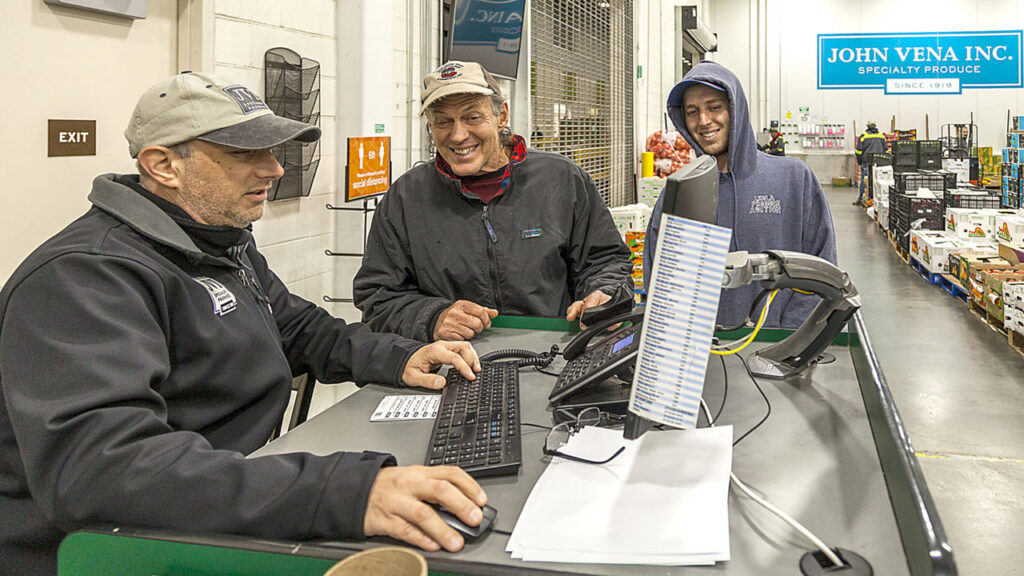
Strategic alliances form a new base of services. For example, more than 30 years ago, JVI was asked to source pre-ripened Hass avocados. “Since that time, and in partnership with West Pak Avocado, our pre-conditioning program has grown to include on-site facilities and everyday processing of avocados, plantains and mangos,” says Vena.
“A broadliner’s request to help solve a fresh herb problem blossomed into a boutique repack facility to provide packed-to-order items not only to foodservice, but to meal kit providers and retailers,” he adds. “These were profound changes in our business and allowed us to continue to grow.”
Growers, processors, corporate procurement, executive chefs and restaurant management see their distributors as key partners well-positioned to offer solutions beyond getting produce from point A to B, explains Itule.
“The solutions we offer have evolved as a direct response to how customers and industry partners need us to support their businesses,” he says. “These include connecting growers and chefs for seasonal menu planning, supporting regional and national clients with seamless integrations into procurement and restaurant management platforms and building standardized order guides for school districts, so they can meet FFVP and USDA requirements.”
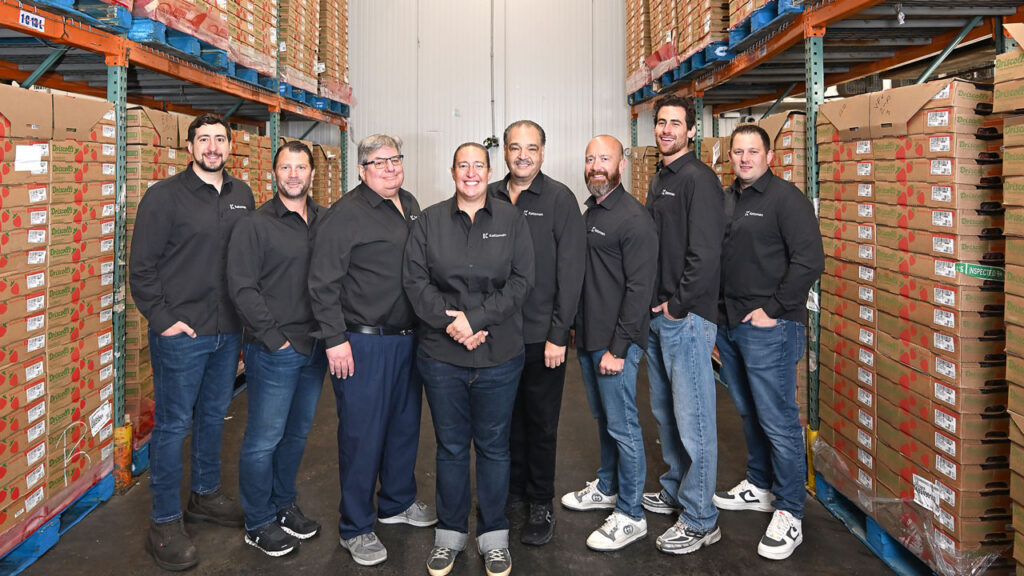
However, at its core, the industry remains a people business. “Relationships are what drive this industry forward,” says Stefanie Katzman, chief executive of Katzman Produce “We’ve grown and adapted with the times, but our foundation is still built on strong partnerships and trust.”
Dominic Riggio, president at Riggio Distribution Co. in Detroit, MI, emphasizes the value of relationships — both supply and sales. “A quality wholesaler is an extension of the customer’s buying team with invaluable knowledge and experience,” he says.
MEETING CUSTOMER EXPECTATIONS
Expectations for wholesalers evolve as customers look for more of everything. “Wholesalers are increasingly valued for added services,” says Cotê. “Retailers want flexible delivery options and advice on trends, pricing and consumer preferences to stay competitive. Wholesalers who provide training, marketing tools, and innovative product solutions strengthen partnerships, help retailers drive sales, reduce shrink, and meet shopper expectations.”
As customers look to improve operations, they expect vendors to do the same, explains Dietz of Heartland. “Vendors are expected to stay ahead of industry trends, technological advancements, and consumer preferences to stay relevant.”
Competition among retailers is strong, which puts pricing pressure on produce, as well as a desire to be first-to-market with new products, states Bonnie Fuson, vice president of customer experience at Pacific Coast Fresh.

“Our foodservice customers continue to demand locally sourced, but there’s also growing appreciation for value-priced items as operators navigate economic pressures. Customers are increasingly accustomed to online ordering and want the ability to select the exact produce that meets their needs.”
Customers want a one-stop vendor that can deliver exactly what they need, how they need it, when they need it, explains Grainger. “We have vast grower networks in place to get whatever product they want at the highest quality, and then prepare it for their end use so they don’t have to outsource that layer of work,” he says.
“Customers are also looking for transparency and access, being able to track their deliveries, contract drivers, and submit orders with as little friction as possible.”
Bashas’ and Food City’s Garris points out that retailers demand effective communication, transparency and strong customer service. “To improve our planning, we want wholesalers to work as an extension of our own teams, exchanging data on crop conditions, pricing patterns, and possible supply issues,” she says. “Additionally, there is a stronger focus on sustainability, traceability and food safety. We easily identify wholesalers who assist us in meeting those standards.”
SHARING EXPERTISE
Customers rely on wholesale expertise. “It’s knowledge of price, quality and other information,” says Natasha Carr, director of operations for Chelsea Morning Provisions in Ipswich, MA. “We differentiate our business by fully purchasing from our local wholesale market and looking over what we buy every single day. We are invaluable because we have the relationships for quality, supply and correct information.”
Wholesaler know-how becomes even more important in a tight economy, according to Talia Shandler, director of sales at S.G.S. Produce in Los Angeles, CA. “Retailers depend on wholesalers a little more for consolidated loads,” she says. “Wholesalers can be nimble and offer what customers want. Issues with climate and changes in growing areas play to wholesale strengths in knowing information and advising the customer.”
Wholesalers provide expertise for procuring variety and specialized options. “Customers are asking for very unique varieties or items,” says Carr. “We’ve expanded into items for small plates or charcuterie boards since this is really trending.”
Katzman Produce partners with suppliers to provide specific packaging and merchandising options. “Customers increasingly look for higher-quality packaging that not only protects, but also effectively merchandises product at retail,” says Andreani. “There’s also growing demand for organic options, so we’ve launched a dedicated organics department.”
Four Seasons Produce in Ephrata, PA, is committed to organics and is also connecting producers with retailers and buyers in the emerging regenerative agriculture space. “Regeneration is about building up healthy soil that creates resilient farms, prevents erosion, absorbs more water and resists drought, captures carbon, and produces vibrant and nutrient-dense food,” explains Jonathan Steffy, vice president and general manager. “We’re working with local regenerative farms as well as others around the country, including buying regenerative and regenerative organics from trial plots at major grower-shippers.”
CONTINUOUSLY IMPROVING
Wholesalers continue to hone their abilities. Over the last 25 years, Nickey Gregory Company in Forest Park, GA, has expanded to include overnight delivery throughout the Southeast; fresh-cut processing for foodservice and retail; banana and avocado ripening; retail support DSD; hands-on in-store merchandising; and crossdocking programs.
“We continue to expand our retail support division, adding retail-specific items, including commodities and fresh-cut processed items,” says Andrew Scott, vice president business development and marketing.
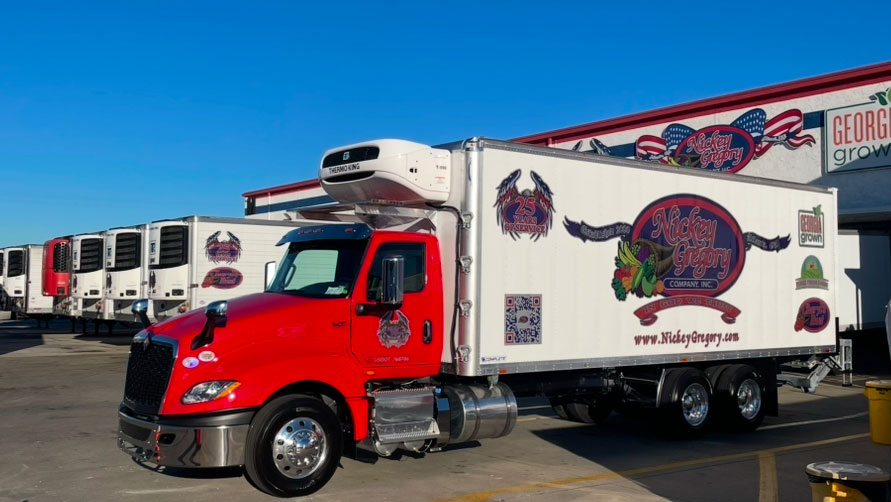
Itule points out the strategic advantage of his company’s ability to pivot. “This dynamic has positioned us to broaden our portfolio in service to customers. For example, our team has procured Dubai chocolate ingredients to complement the strawberries we sell.”
Ben B. Schwartz & Sons is currently expanding its distribution radius to new regions between Toronto and Atlanta, and into Texas. “We’re offering new bagging and repacking services based on customer demand, such as our new mesh citrus bags,” says Grainger. “We want to keep being a trusted partner to our customers while bringing our reliable distribution and high-quality products to new customers.”
Pacific Coast Fresh is steadily expanding its line, enhancing local and regional selections while continuing to bring in unique global items, says Brugato. “We’ve launched prepared foods and a new line of hummus products. In foodservice, we’re focused on supporting chefs and operators with consistent quality and dependable supply.”
D’Arrigo New York looks to support customer expansion and grow with its partners. “Our customer base is changing the way they’re doing business, so we partner with them on their expansions,” says D’Arrigo. “In turn, this increases our productivity and relationships with our suppliers because we bring in more product.”
Chelsea Morning Provisions seeks to relocate in the near future. “We’re on the hunt for a new warehouse,” says Carr. “We want to make operations as streamlined as possible and ensure customers feel very taken care of.”
EMPHASIZING LOGISTICS
Dealing with the logistics aspects of the business has become essential. “There is always something in the logistics chain that causes some degree of pain,” says Hutch Morton, senior vice president at J.E. Russell Produce in Toronto, Ontario. “Port issues, freight availability and rates, border regulations — it’s never-ending. Our strong team is able to work proactively with partners to find solutions.”
D’Arrigo aims to be a logistics expert for the supplier and the customer. “The job of a wholesaler is to figure it out and have a solution no matter what,” she says. “Many shippers don’t have their own trucks, so they rely on us to arrange the logistics all the way to the customer. We started delivery in the 1990s and now operate a fleet of over 70 trucks.”
Many wholesalers have progressed to offering in-house delivery and logistics. Nickey Gregory has its own logistics team handling all inbound and outbound shipments. “This includes managing our fleet of over 50 trucks,” says Scott. “We offer FOB and delivered pricing to customers.”
Solving supply chain problems for large national retailers and the grower-shippers serving them in ways Four Seasons Produce couldn’t as a wholesaler was the impetus for starting a new sister company, Sunrise Logistics, in 2006, according to Steffy.
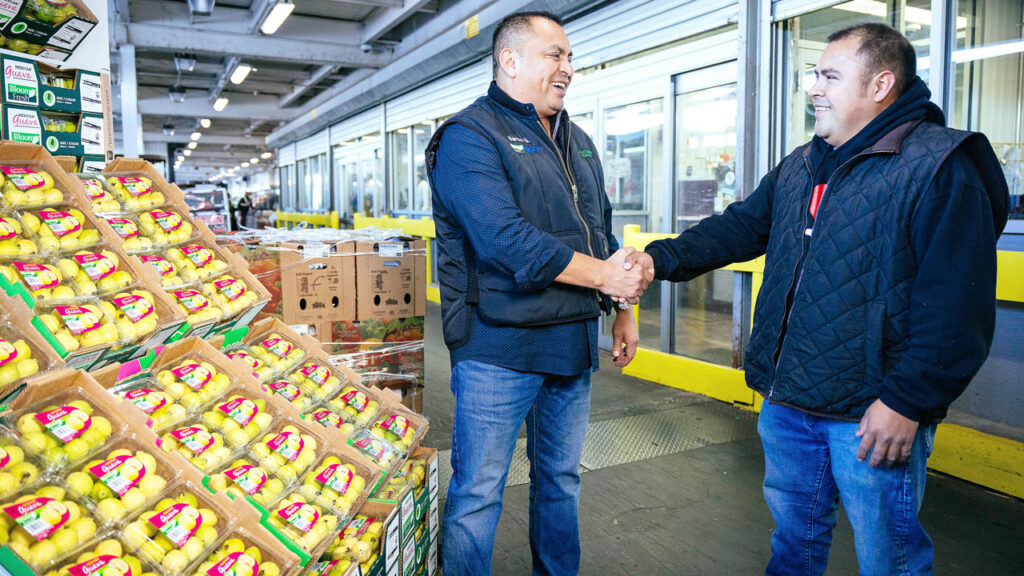
Katzman Produce has grown from a single truck to a full fleet. Today, it operates a fleet of refrigerated, technologically advanced trucks and trailers servicing hundreds of customers each week, says Andreani.
Wholesalers continue to find creative solutions to transportation challenges. “To help buffer against volatility and support driver retention, we are moving toward leasing our fleet instead of owning,” says Ted Hendryx, chief operating officer at Pacific Coast Fresh. “Along with refined driver productivity incentive programs, these steps will help us manage costs and mitigate labor increases.”
• • •
Not Your Grandfather’s Wholesale System
Wholesalers are embracing technology to support customers and increase efficiency.
“Improvements include advanced ordering platforms, real-time inventory tracking, and route optimization for faster deliveries,” says Mark Cotê, produce merchandiser at Redner’s Fresh Markets in Reading, PA. “Cold-chain management and data-sharing tools ensure freshness and reduce shrink. These upgrades create greater efficiency, reliability, and stronger partnerships between wholesalers and retailers.”
Kristina Garris, executive director of fresh for Bashas’ and Food City, a division of the Raley’s Companies, in Chandler, AZ, has observed wholesale investments in enhanced order tracking technologies, more effective routing, and better cold chain management.
“Many provide a real-time view into deliveries and inventories, which aids in more precise planning and shrink reduction,” she says. “To reduce expenses and enhance freshness, some have even created tools to combine loads or plan cross-docking. This type of innovation is becoming a differentiator in the business.”
Decades ago, specialized technology was primarily for very large companies, explains Talia Shandler, director of sales at S.G.S. Produce in Los Angeles, CA, but now it’s accessible to everyone. “Most everyone is using tech and digital tools to share orders and for warehouse and inventory management,” she says. “We’re so much more sophisticated in our truck management and temperature trackers.”
BETTER MANAGEMENT
Willie Itule Produce in Phoenix, AZ, has strategically invested in technology to streamline operations and enhance customer experiences. “Our Warehouse Management System is central to day-to-day operations,” says Billy Itule, chief executive. “Facilitating API integrations is a standard operating procedure for many clients. Customers expect the same ordering experience they offer patrons, so we built our ordering app on one of the industry-leading platforms, Pepper.”
Ben B. Schwartz & Sons in Detroit, MI, launched its own proprietary platform, Ben B. Access. “We built our own so we can integrate with third-party solutions,” says Jordan Grainger, vice president of sales and business development. “Our platform allows us to expedite orders, deliver with greater precision, automate administrative tasks and analyze data to help us better predict future purchasing decisions. We know customer pain points will change over time, and Ben B. Access gives us the agility to change with them.”
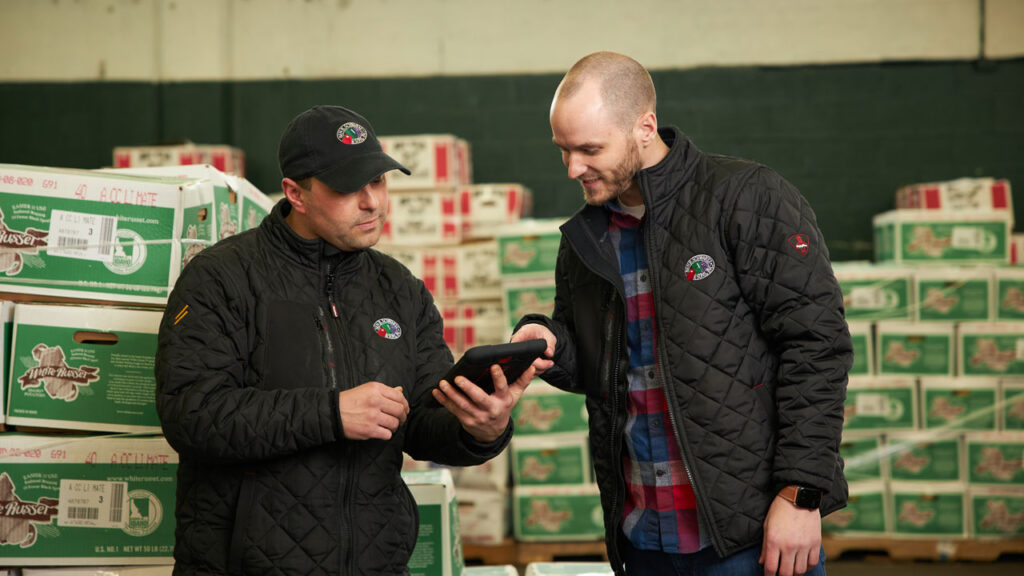
Riggio Distribution Co. in Detroit, MI, uses custom software for sales, accounting, and operations. “Our customers benefit from the reporting, inventory controls and accuracy, as well as up-to-date information,” says Dominic Riggio, president.
LOGISTICS EFFICIENCY
Heartland Produce in Kenosha, WI, constantly evaluates new technology to increase customer service levels and efficiency in operations. “Online ordering, real-time driver updates, dock management tools, and data analytics are all being used,” says Ryan Dietz, president.
D’Arrigo New York, Bronx, NY, has invested in technology for truck tracing and temperature control. “These aspects, as well as our use of technology to optimize routing, are crucial,” says Gabriela D’Arrigo, vice president of marketing and communications. “Up-to-date communication we can relay to the customer or shipper has had a huge impact on our business. Our online ordering process also helps us learn about customer buying habits, which in turn aids our purchasing.”
Pacific Coast Fresh Company in Portland, OR, currently uses Aptean’s Produce Pro with its Warehouse Management System capabilities, allowing for lot-level tracking of all products in the facility.
“We also use their Mobility Application so drivers can gather digital proof of delivery signatures, which are continuously uploaded to our host system,” says Ted Hendryx, chief operating officer. “Aptean’s Paragon routing system allows easy comparison of planned versus actual routes. We use Samsara’s fleet monitoring software to track GPS information, trailer temperature, and camera systems that record critical events.”
NEXT LEVEL
Four Seasons Produce in Ephrata, PA, connects digitally with more customers and suppliers for efficient transactions. “With some, it is EDI, others use our online ordering platform, and some retailer partners are beginning to implement Empower Fresh, an AI-powered produce management tool built for independent grocers,” says Jonathan Steffy, vice president and general manager.
Katzman Produce in Bronx, NY, deploys custom apps to digitize processes, integrating AI for document scanning and automated workflows, optimizing routing for its fleet, and expanding digital learning to upskill its teams, according to Jimmy Chacko, director of technology and innovation.
“Across the business, we’re replacing paper and email-based tasks with real-time dashboards and automated approvals, centralizing data for better analytics, and streamlining processes to reduce inefficiencies and improve service,” he says.
Chelsea Morning Provisions in Ipswich, MA, uses Choco AI to help with orders. “Orders received by voicemail, email, and even fax can include hundreds of items across dozens of pages,” says Natasha Carr, director of operations. “In the past, we’d read or listen to each order, transcribe it, and manually log it into a piece of software. Now, each order is automatically turned into a digital order, allowing us to spend only a few minutes reviewing it. The AI also gets smarter over time, so if a regular customer calls and says ‘give me what I had last time,’ it understands.”
32 of 32 article in Produce Business October 2025

